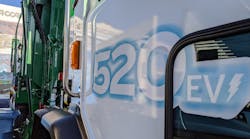Paccar is ramping up the real-world testing of its zero-emission trucks as it prepares to produce more alternative fuel vehicles for customers in 2021.
The biggest delivery from the company came from its Kenworth brand, which recently provided more zero-emission, hydrogen fuel cell Kenworth T680 trucks for customers at the Port of Los Angeles for field testing, Paccar announced.
The trucks, produced at the Kenworth factory in Renton, Wash., integrate Toyota fuel cell technology into the T680. Shell provided hydrogen fuel and infrastructure for the project. Paccar technical centers are providing extensive performance testing.
Paccar — which along with U.S.-based brands Kenworth and Peterbilt, includes the Netherlands-based DAF — now has more than 60 battery-electric, hydrogen fuel cell and hybrid trucks being tested in real-world applications in North America and Europe.
“Industry zero-emissions powertrain deliveries are expected to be modest over the next several years due to the high cost of the technology,” according to Kyle Quinn, Paccar chief technology officer. “Medium-term demand for zero-emissions vehicles will be primarily in refuse, port and local delivery applications which do not require long-distance travel or a network of refueling infrastructure, as well as in locations with government-mandated zero emissions.”
Paccar expects to start delivering battery-electric trucks to more customers in 2021, the company announced this summer.
The city of Anchorage, Alaska, is one of those customers. It used federal grant money to purchase a Peterbilt 520EV refuse truck and a medium-duty Peterbilt 220EV box truck that will be delivered next year. The U.S. Department of Energy awarded the municipal government’s Department of Solid Waste Services (SWS) a $689,659 grant to help fund the city’s first EV trucks and battery charging infrastructure. SWS currently operates a fleet of 70 vehicles, including 22 garbage trucks.
“This is really cool. Anchorage gets to demonstrate innovation and prove sustainability," Mayor Ethan Berkowitz said. “And hopefully the results of this test will validate technology that has benefits across the state and Circumpolar North."
SWS is partnering with Candian company eCamion Inc. to test an electric vehicle charging station that incorporates a large battery. The addition of a battery allows for a steady charge at a lower voltage which will reduce demand rates from electric utilities. This system is expected to save the city money while still providing fast charging to electric trucks, according to the mayor.
Peterbilt has three application-specific battery-electric truck models being used at Western ports and other regional runs. “Peterbilt Model 579EV trucks are deployed in port and regional haul applications; Peterbilt Model 220EV trucks are being utilized in medium-duty pickup and delivery applications; and Peterbilt Model 520EVs are collecting and hauling refuse,” Jason Skoog, Paccar vice president and Peterbilt general manager, said during a recent report on the company’s second quarter.
The Kenworth T680 day cab’s fuel cell combines compressed hydrogen gas and air to produce electricity with water vapor emitted at the tailpipe. The truck was part of the Zero Emission Cargo Transport (ZECT) demonstration project managed through Southern California’s South Coast Air Quality Management District (SCAQMD).
The electricity can power the dual-rotor electric motor to move the truck or recharge the lithium-ion batteries for later use. The hybrid drive system manages the power from the fuel cell to and from the batteries, as well as the traction motors and other components, such as the electrified power steering and brake air compressor.
California has set ambitious goals to make diesel-powered trucks and vans extinct by the middle of the century. The state’s air pollution board will soon require fleets to buy more zero-emission vehicles. The California Air Resources Board (CARB) adopted the first-in-the-nation new clean-truck standard in June.
The initial focus of the regulations is on larger fleets with vehicles suitable for early electrification, those fleets’ subhaulers, and the large companies that hire them. It will limit how many diesel-powered vehicles manufacturers can sell in the state starting in 2024. Those limitations will increase until 2045 when all new Class 2 through Class 8 vehicles sold in the Golden State must be zero-emission.
CARB estimates that 2 million diesel trucks cause 70% of the smog pollution in California. When announcing its decision, CARB noted that many California neighborhoods — particularly those of minorities and low-income residents — are near ports, railyards, distributions centers and other freight corridors that see the most truck traffic. The new rule, the board noted, directly addresses the pollution affecting these communities.




